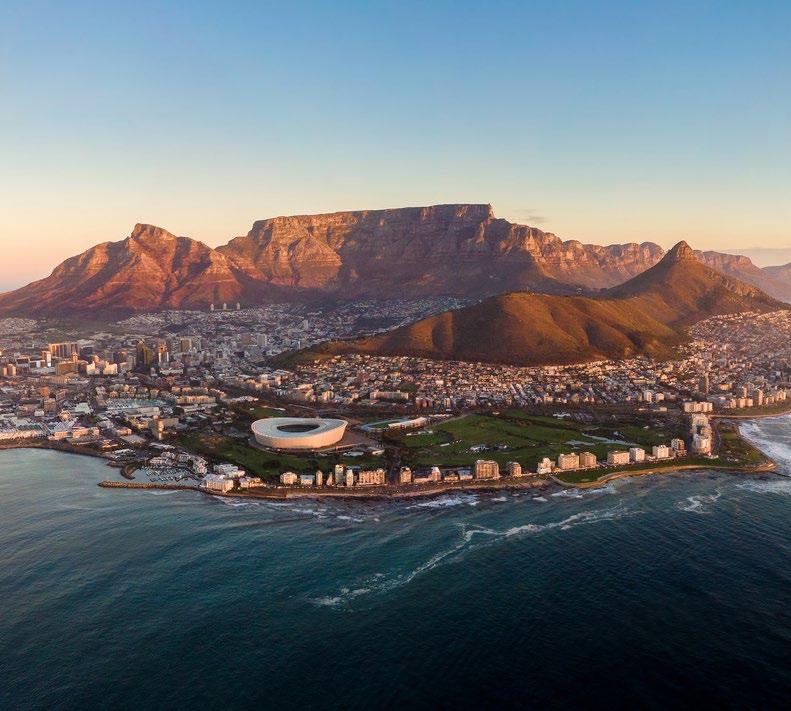
4 minute read
Regional Focus - Western Cape
Tourism In The Western Cape: A Thriving Industry Driving Economic Growth
By Jessie Taylor
The Western Cape continues solidifying its reputation as a premier tourism destination, attracting record-breaking international and domestic visitors.
With over 160 000 international arrivals in December 2024 alone - a twelve-year high - the province is experiencing an unprecedented surge in travel demand. This growth underscores the need for strategic infrastructure development, particularly the expansion of Cape Town International Airport, to accommodate rising visitor numbers and sustain the province’s booming tourism sector.
The Rise of Cruise Tourism In Cape Town
The economic impact of cruise tourism is undeniable. The 2023/24 season alone generated R1.32 billion for the regional economy, up from R1.2-billion the previous year. Direct expenditure related to vessels and passengers reached R1.5-billion, reflecting the industry’s substantial contribution to local businesses.
Cape Town’s favourable late summer climate and strategic positioning make it a prime destination for cruise liners. Many international shipping companies schedule port calls in Cape Town as they reposition fleets between hemispheres. This trend is expected to continue, further enhancing the city’s appeal as a must-visit cruise destination. As South Africa’s cruise season reaches its peak, Cape Town is witnessing a significant influx of cruise ships, further cementing its status as a global travel hotspot. Cruise Cape Town, a division of Wesgro, the official tourism, trade, and investment promotion agency for the Western Cape, announced that March 2025 would see 24 cruise ship calls at the Cape Town Cruise Terminal, contributing to the city’s vibrant tourism sector.
The 2024/25 season is expected to welcome 76 ship calls - an increase from the previous year’s 67 - indicating a growing demand for cruise travel to t he Western Cape. The continued growth of tourism in the Western Cape is not only boosting the economy but also creating employment opportunities.
Alderman James Vos, Mayoral Committee Member for Economic Growth, highlighted that for every 36 cruise passenger arrivals, one job is created. This multiplier effect benefits local businesses, from hotels and restaurants to transport services and tour operators.
To manage the increasing influx of tourists, the City of Cape Town, in collaboration with industry partners, has implemented proactive traffic management strategies. The V&A Waterfront, which operates the Cape Town Cruise Terminal, has introduced enhanced security measures and designated transport options to ensure a seamless visitor experience.
Investing In Infrastructure
To sustain this tourism boom, ongoing investment in infrastructure and marketing is essential. The expansion of Cape Town International Airport, the launch of innovative digital resources like the Wesgro Playbooks, and the continued growth of cruise tourism all contribute to the Western Cape’s tourism success.
Wesgro, the official tourism, trade, and investment promotion agency for the Western Cape, has launched a suite of digital resources known as “Playbooks.” These resources, including itineraries, maps, images, videos, and blogs, aim to provide industry stakeholders with essential tools to market the region effectively. Wesgro CEO Wrenelle Stander highlighted that the Playbooks address key post-pandemic challenges in the tourism sector by ensuring that destinations are easily understood and accessible through digital media.
The Playbooks are organised around themes such as gastronomy, golf, Halal tourism, and sustainability. These themes align with the Western Cape government’s tourism blueprint, showcasing the region’s diverse offerings. By providing readily available marketing resources, Wesgro is strengthening the tourism industry, enabling operators to promote the Western Cape’s attractions to both local and international audiences.
Western Cape Minister of Agriculture, Economic Development, and Tourism, Dr. Ivan Meyer, praised the initiative, emphasising that digital marketing tools are essential for reaching global audiences. As tourism remains a key economic driver, leveraging digital media ensures the Western Cape remains competitive in the international tourism landscape
With tourism playing a critical role in the Western Cape’s economy, improved airport infrastructure is necessary to support continued growth and maintain the province’s status as a top-tier travel destination. During his State of the Province Address, Premier Alan Winde emphasised the urgency of expanding Cape Town International Airport to keep pace with growing tourism. The Cape Air Access Initiative has been instrumental in this expansion, introducing seven new airlines and routes, contributing to a total of one million inbound seats.
With a well-rounded strategy that includes digital transformation, infrastructure development, and targeted marketing campaigns, the Western Cape is poised to remain a leading global travel destination. As visitor numbers continue to climb, the province’s commitment to tourism growth will ensure lasting economic benefits for local communities and businesses alike.
Source: IOL | Timeslive | iAfrica










